|
|
Information
Service of
the Serbian Orthodox Church
March 12,
2005

SERBIAN PRESIDENT MEETS REPRESENTATIVES OF TRADITIONAL
CHRISTIAN CHURCHES IN BISHOP’S RESIDENCE IN NOVI SAD
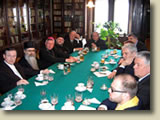 Yesterday morning in the Bishop’s residence in Novi Sad His
Grace Bishop Irinej of Backa, together with His Grace Bishop
Vasilije of Srem, His Grace Vicar Bishop Profirije of Jegar,
and heads and highest representatives of the traditional Christian
Churches in Serbia, including the Roman Catholic Church: Archbishop
of Belgrade Stanislav Hocevar, chairman of the International
Bishops’ Conference Sts. Cyril and Metodius, Bishop of Subotica
Dr. Janos Penzes, and Rt. Rev. Dr. Andrija Kopilovic, pro-rector
of the Catechistic Theological Institute in Subotica; Bishop
of the Reform Christian Church, Istvan Cete-Semesi; Bishop of
the Slovak Evangelical Church, Samuel Vrbovski; and Bishop of
the Christian Evangelical Church, Arpad Dolinski, received Dr.
Boris Tadic, president of the Republic of Serbia. The reception
was also attended by Mr. Bojan Pajtic, chairman of the Vojvodina
Executive Council, and Dr. Vojislav Milovanovic, master builder
of St. Sava Church, both of whom also took part in the discussion. Yesterday morning in the Bishop’s residence in Novi Sad His
Grace Bishop Irinej of Backa, together with His Grace Bishop
Vasilije of Srem, His Grace Vicar Bishop Profirije of Jegar,
and heads and highest representatives of the traditional Christian
Churches in Serbia, including the Roman Catholic Church: Archbishop
of Belgrade Stanislav Hocevar, chairman of the International
Bishops’ Conference Sts. Cyril and Metodius, Bishop of Subotica
Dr. Janos Penzes, and Rt. Rev. Dr. Andrija Kopilovic, pro-rector
of the Catechistic Theological Institute in Subotica; Bishop
of the Reform Christian Church, Istvan Cete-Semesi; Bishop of
the Slovak Evangelical Church, Samuel Vrbovski; and Bishop of
the Christian Evangelical Church, Arpad Dolinski, received Dr.
Boris Tadic, president of the Republic of Serbia. The reception
was also attended by Mr. Bojan Pajtic, chairman of the Vojvodina
Executive Council, and Dr. Vojislav Milovanovic, master builder
of St. Sava Church, both of whom also took part in the discussion.
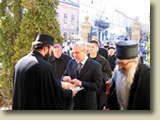 Yesterday’s meeting in Novi Sad was especially significant because
it was the first meeting of a Serbian president with the highest
representatives of Churches in Serbia. Yesterday’s meeting in Novi Sad was especially significant because
it was the first meeting of a Serbian president with the highest
representatives of Churches in Serbia.
Discussion of issues such as the restoration of nationalized
church property, the social and status position of the Churches,
clergy and faithful, enhancement of religious instruction in
public schools, the introduction of a chaplain’s post in the
army, and the role of the Church in the media were conducted
in an atmosphere of complete accountability and mutual understanding.
The Serbian President also discussed problems with which every
Church separately is confronted on a daily basis with great attention
and interest.
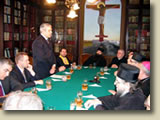 Upon the conclusion of the meeting, President Tadic stated for
numerous reporters gathered in front of the Bishop’s residence
that the meeting that just took place was exceptionally significant
and that complete consensus and understanding was achieved regarding
the further contribution of traditional Churches on the territory
of Serbia towards the nurturing of peace, tolerance, dialogue
and cooperation. “We also discussed the specific difficulties
of each individual Church and found that most problems were common
to all,” said Mr. Tadic. “Taking into account the political process
of which we are a part, the Church is certainly a part of society
and should be consulted with respect to many issues important
to the life of each individual and this whole society. The views
as well as the position of every one of the historic Churches,
the way they are kept and human rights connected with religious
rights are completely equal.” Also discussed at the meeting were
the rights of citizens of Islamic faith, in the very spirit of
tolerance and cooperation which were expressed today by all participants
in today’s meeting, stated the Serbian president. Upon the conclusion of the meeting, President Tadic stated for
numerous reporters gathered in front of the Bishop’s residence
that the meeting that just took place was exceptionally significant
and that complete consensus and understanding was achieved regarding
the further contribution of traditional Churches on the territory
of Serbia towards the nurturing of peace, tolerance, dialogue
and cooperation. “We also discussed the specific difficulties
of each individual Church and found that most problems were common
to all,” said Mr. Tadic. “Taking into account the political process
of which we are a part, the Church is certainly a part of society
and should be consulted with respect to many issues important
to the life of each individual and this whole society. The views
as well as the position of every one of the historic Churches,
the way they are kept and human rights connected with religious
rights are completely equal.” Also discussed at the meeting were
the rights of citizens of Islamic faith, in the very spirit of
tolerance and cooperation which were expressed today by all participants
in today’s meeting, stated the Serbian president.
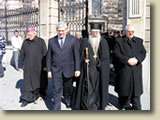 Bishop Irinej expressed satisfaction with today’s visit by the
president of the Republic of Serbia to the Diocese of Backa,
as well as with the fact that the Serbian Orthodox Church, i.e.
the Diocese of Backa hosted a meeting of all traditional Churches
active on the territory of Vojvodina and throughout Serbia. Bishop
Irinej emphasized that occasionally one hears the opinion that
the Church’s statement of its views on social and human issues
may endanger the secular character of the State; however, he
said, at today’s meeting just the opposite was shown to be true.
“The freedom and accountability of the Church contribute to a
more substantive coexistence between State and Church, taking
in account the fact that the majority of the citizens of our
country are also faithful members of their Churches.” Participants
in the meeting also established that cooperation between State
and Church can contribute to the further democratization and
development of society in accordance with the lives of citizens
in other parts of Europe. Only through dialogue, mutual confidence
and cooperation among all traditional Churches and other religious
communities together, and with all bearers of public responsibility
in our society it is possible to achieve all standards that are
necessary for the normal functioning of society as a whole, concluded
Bishop Irinej. Bishop Irinej expressed satisfaction with today’s visit by the
president of the Republic of Serbia to the Diocese of Backa,
as well as with the fact that the Serbian Orthodox Church, i.e.
the Diocese of Backa hosted a meeting of all traditional Churches
active on the territory of Vojvodina and throughout Serbia. Bishop
Irinej emphasized that occasionally one hears the opinion that
the Church’s statement of its views on social and human issues
may endanger the secular character of the State; however, he
said, at today’s meeting just the opposite was shown to be true.
“The freedom and accountability of the Church contribute to a
more substantive coexistence between State and Church, taking
in account the fact that the majority of the citizens of our
country are also faithful members of their Churches.” Participants
in the meeting also established that cooperation between State
and Church can contribute to the further democratization and
development of society in accordance with the lives of citizens
in other parts of Europe. Only through dialogue, mutual confidence
and cooperation among all traditional Churches and other religious
communities together, and with all bearers of public responsibility
in our society it is possible to achieve all standards that are
necessary for the normal functioning of society as a whole, concluded
Bishop Irinej.
In his statement for the press, Archbishop Stanislav Hocevar
emphasized the importance of joint action by all Churches and
religious communities towards the development of our society,
which is also helped by regular meetings where discussion is
held in the spirit of dialogue and joint action.
From the Office of the Bishop of Backa 
DELEGATION OF EUROPEAN COMMISSION IN SERBIA-MONTENEGRO VISITS
BISHOP IRINEJ OF BACKA 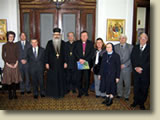 On Friday, March 11, His Grace Bishop Irinej of Backa, together
with representatives of the traditional Churches in Serbia: bishops
of the Reformation Churches Mr. Samuel Vrbovski (Slovak Evangelical
Church), Mr. Istvan Cete-Semesi (Reform Christian Church), Mr.
Arpad Dolinski (Evangelical Christian Church) and Sister Ines
of the Archbishopric of Belgrade (Roman Catholic Church, as well
as the woman president of the Novi Sad Jewish Community, Dr.
Ana Frenkel, received in the Bishop’s residence in Novi Sad a
delegation of the European Commission in Serbia-Montenegro headed
by the European Union ambassador in Belgrade, Mr. Josep Loveras,
who was accompanied by Mr. David Hudson, first secretary, and
Mrs. Sanda Babic. On Friday, March 11, His Grace Bishop Irinej of Backa, together
with representatives of the traditional Churches in Serbia: bishops
of the Reformation Churches Mr. Samuel Vrbovski (Slovak Evangelical
Church), Mr. Istvan Cete-Semesi (Reform Christian Church), Mr.
Arpad Dolinski (Evangelical Christian Church) and Sister Ines
of the Archbishopric of Belgrade (Roman Catholic Church, as well
as the woman president of the Novi Sad Jewish Community, Dr.
Ana Frenkel, received in the Bishop’s residence in Novi Sad a
delegation of the European Commission in Serbia-Montenegro headed
by the European Union ambassador in Belgrade, Mr. Josep Loveras,
who was accompanied by Mr. David Hudson, first secretary, and
Mrs. Sanda Babic.
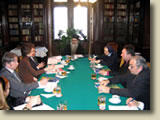 The Bishop of Backa, acting as host, directed words of welcome
with respect and love to the high guests, and wished everyone
a pleasant stay in Novi Sad. The Bishop of Backa, acting as host, directed words of welcome
with respect and love to the high guests, and wished everyone
a pleasant stay in Novi Sad.
On behalf of the delegation of the European Commission in Serbia-Montenegro,
Ambassador Loveras greeted Bishop Irinej and the representatives
of the Churches and religious communities in Serbia, expressing
his satisfaction at the opportunity to once again, after the
Conference on the contribution of the Churches to religious,
cultural and national cooperation on the path to European integrations
held last autumn in Becej, have the opportunity to meet with
representatives of the Churches and religious communities, and
to discuss issues relating to the attitude of the Churches and
religious communities and contemporary Serbian society toward
the values that define modern Europe and toward European integrations.
Bishop Irinej and the other representatives of the Churches
unanimously expressed the view that since European civilization
is largely based on values created in the cradle of Christianity,
they are naturally the witnesses and bearers of such values,
and that by carrying out their mission, they are representing
principles such as love towards one’s neighbor, individual dignity,
peace and social justice, which should characterize the European
Union and all European countries.
The participants in the discussion agreed that the model of
cooperation which the Churches and religious communities are
nurturing among themselves and with respect to secular bearers
of public responsibility, as well as their common life in peace,
mutual respect and spiritual and cultural interweaving of peoples
who live in Vojvodina and throughout Serbia represent a good
way of preparing the whole of Serbian society for European integrations.
In the eyes of the faithful, first and foremost, in the eyes
of Christians, the process of shaping “a uniquely European home”
may have a successful and lasting outcome if it is primarily
based on a unity of spirit with acknowledgement and nurturing
of everyone’s national and cultural identity, not just exclusively
on economic interest and political convenience.

[Serbian
Translation Services]
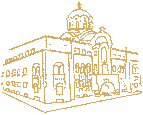
Copyright © 1999-2004 by
The Information Service of the Serbian Orthodox Church
11000 Belgrade
Kralja Petra I no.5
+381 11 3282 596
e-mail
|

